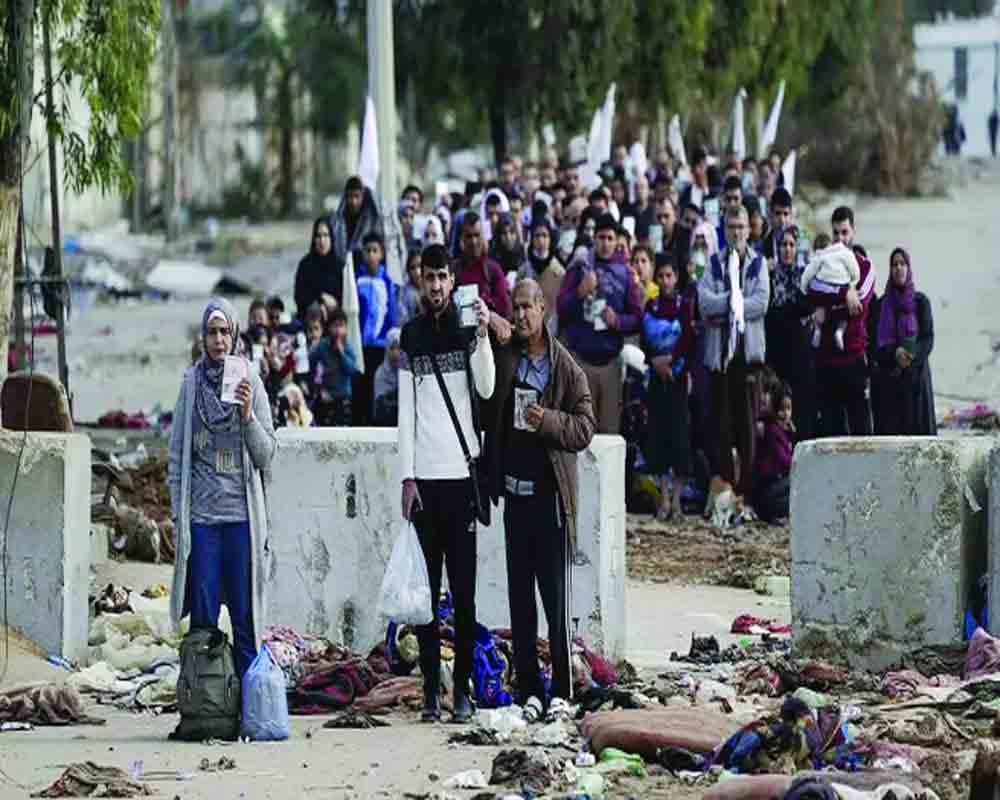The Sheikhdoms had no idea of the Hamas plan as they were engrossed in mending fences with Israel as part of the Abrahamic Agreement
As green shoots of truce finally dawn via the proposed exchange of hostages in the bloody Israel-Hamas war, it is time to reflect on the conduct of those who threatened to intervene but didn’t. For starters, unlike the earlier Israel-Arab Wars i.e., Israel’s War of Independence/Palestinian Nakba (1948-49), Suez Crisis (1956), Six-Day War (1967), Yom Kippur War (1973) – the 2023 War in the region was strictly between Israel and the Palestinian terror group Hamas, as sabre-rattling notwithstanding, no Arab Sheikhdom, Iran or armed militias like the Lebanese Hezbollah joined in the war.
Clearly, the Sheikhdoms had no idea of the Hamas plan as they were engrossed in mending fences with Israel as part of the Abrahamic Agreement. Israeli embassies were sprouting from Abu Dhabi, Manama, Rabat, Khartoum et al and the shadowy Israeli confabulations with the Saudis were the worst-kept secret of the region.
The restive region was almost clinically cleaved into a sectarian ‘divide’ with only Shiite Iran and its co-sectarian proxies like the Lebanese Hezbollah and Yemeni Houthis, yet to reconcile to rapprochement with Israel. Within the Sunni side of the ‘divide’, the animus with Israelis was reducing with traditional alternatives in the form of militias like the Al Qaida or later, the Islamic State of Levant (ISIL) on the retreat. Politically too, the alternative phenomenon to the Muslim Brotherhood which sought to delegitimise the motley crew of Arab monarchies, dictators and dynasts had been de-fanged as part of the post-Arab Spring cleansing.
Consequently, this left the Sunni grouping of Hamas (ideologically aligned to Muslim Brotherhood sensibilities) isolated with very few sovereign backers, save the oddity of making common cause with Shiite Iran and its proxies in the region. It was an unnatural and imperfect alliance that was borne of necessity (from Hamas’ perspective) and topical opportunity (from Iran’s perspective, as it added to Tehran’s outreach, especially since the usual appeal of sectarianism wasn’t relevant in the Palestinian context). Understandably, Tehran supported Hamas politically and materially but may still not have had the necessary levers or the extent of control that was invokable with say Hezbollah.
This essentially meant that Hamas did not have too many committed backers who could have intervened on its behalf, should the exigency so demand. Unsurprisingly it was left to yet another odd Arab power, Qatar, who too had a testy relationship with the other Saudi-led Sheikhdoms and instead a more working relation with the sectarian ‘other’ i.e., Iran, to mediate on behalf of Hamas. The role of Doha along with that of Washington DC is writ all over the current truce agreement.
The feeble anti-Israel line mouthed by the Arab Sheikhs or even countries like Turkey, Malaysia or Pakistan were more towards ticking the box of demonstrated empathy towards the hapless Palestinians, as imagined by its citizens.
If anything, the Arab Sheikdoms were more aligned with the rival Palestinian group of Fatah, and therefore may not have shed too many tears to see the diminishment of Hamas, a Muslim Brotherhood affiliate. Necessity rather than conviction dictated their supposedly anti-Israeli stand.
Hamas literally went into the provocative and unforgiving act of attacking Israel unaligned with any major regional power (sovereign or militia) and subsequently paid for it in terms of abject isolation when the Israelis responded disproportionately, killing thousands of Palestinian civilians. It is widely believed that the Iranian Supreme Leader bluntly told the Hamas leadership that as Tehran was not kept in the loop about Hamas’s 7th October attack, the Iranians would not enter on its behalf. Tellingly, Tehran kept voicing concerns and dissuading against the escalation and spread of the conflict, across the region.
This Iranian ‘distance’ is in stark contrast to the tangible and significant support offered to Shiite Houthis in the battlefield of Yemen or even to the forces aligned to co-sectarian Syrian President, Bashar Al Assad (who is an Alawite, a syncretic offshoot of Shiite-leaning). Tehran has not shied away from deploying its official and unofficial forces and elements like drones, missiles and other weaponry to take on American or Arab interests, but not so in the case of Hamas.
The desperation was palpable when Hamas’ leader Mohammed Deif pleaded with Iran and its proxies, “Our brothers in the Islamic resistance in Lebanon, Iran, Yemen, Iraq and Syria, this is the day when your resistance unites with your people in Palestine” – meaningless platitudes aside, Hamas was essentially left to fend for itself.
Israel read the situation early and pressed on relentlessly in the Gaza Strip, knowing that the Hamas had not just shot the Palestinian cause, and compromised the innocent civilians but also itself with the act that looked extremely impressive in the beginning but had unimaginably painful consequences to follow.
Should peace return to the Gaza Strip, the chances that any regional power will thereafter support Hamas (or even Benjamin Netanyahu is Israel) to retain its legitimacy and relevance is highly unlikely, as Fatah with its moderate anchorage will seem more reasonable to support. The economic condition in Iran or the United States (and even Israel) is such that they can barely afford any more suicidal attempts like the 7th Oct attack, and its aftermath – truce and peace is what they all want, even if they can’t say it.
(The writer, a military veteran, is a former Lt Governor of Andaman & Nicobar Islands and Puducherry. The views expressed are personal)


























